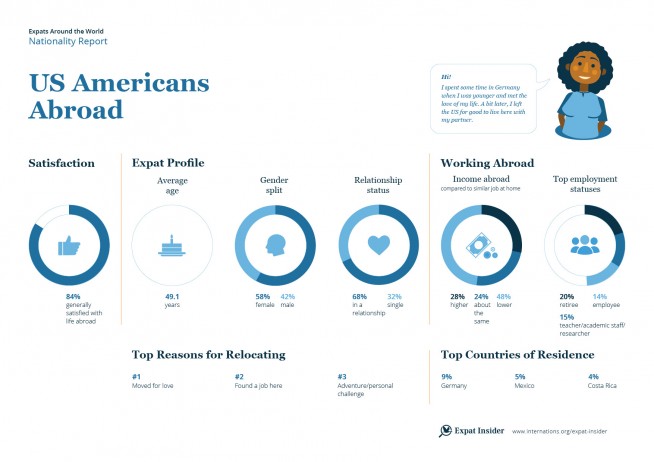US Americans: Inexperienced Expats Relocating for Retirement
- Inexperienced expats quickly settling into life abroad
- 16% move for love
- One-fifth are retirees
- Very satisfied with work-life balance
- Struggle to learn language but not to make friends
Enjoying Their First Move Abroad
Over one-third of US American expats (36%) are currently living abroad for the first time, and one in ten has been living overseas for less than six months. Despite this lack of experience, respondents from the US have adjusted to expat life relatively quickly, with over one-fifth (21%) saying they felt at home nearly straight away and two-thirds (67%) stating that they feel at home in the local culture.
Two-fifths plan to stay abroad forever. In fact, 15% of respondents have even acquired the citizenship of their host country; this might only be three percentage points higher than the global average, but it’s a relatively large number considering the most popular destination among US expats is Germany — a country where it's particularly tricky to acquire citizenship, unless you come from elsewhere in the EU.
Romantic Reasons for Relocating
With 16% of US Americans moving abroad to live in their partner’s home country, romance is the most popular reason for relocating. Americans are big fans of international love, as over two-fifths of those currently in a relationship (45%) have a partner who comes from their host country and half met their other halves outside of the US. Luckily, an impressive 86% say they’re satisfied with their relationship. This may be connected to the fact that few American expats are in a long-distance romance: less than a tenth (8%) live in a different country to their partner, compared to a global average of 13%.
Moving for a Richer Retirement
One-fifth of US American expats are retirees, making this the most common employment status among respondents. Mexico — where 5% of US American respondents live — and Costa Rica (4%) are the second and third most popular destination among expats from the US. Both of these countries make it into the top 5 of International Living’s Best Places to Retire list, largely because of the low cost of living.
Better Work-Life Balance
Despite the high number of retirees, three-fifths of US American expats abroad do work, and over three-quarters of them (76%) work full-time. When it comes to overall job satisfaction, respondents are pretty happy, with nearly two-thirds (66%) rating this factor positively (global average: 64%). This is largely thanks to work-life balance, which close to two-thirds of US Americans (66%) are satisfied with.
Almost one-tenth (9%) are living in Germany, making this the most popular destination among US Americans. Germany offers employees the eighth best work-life balance in the world, and companies there are required to offer employees at least 20 paid vacation days a year. This may be one reason why the country came in at a respectable 20th place out of 65 countries in the Work-Life Balance subcategory of the Working Abroad Index.
Nearly two-thirds of US Americans abroad (65%) are also happy with their working hours. While US expats working full time do not have an abnormally short week (43.7 hours compared to the global average of 44.3), their working hours are significantly shorter than they would be back home. In the US, employees work 1,674 hours per year on average compared to 1,371 hours in Germany, explaining why one US American respondent in Germany stated that their work-life balance means “less stress” and “more time for family”.
Can’t Quite Find the Words
US Americans abroad struggle when it comes to language learning. Two-fifths of US expats say they can only speak a little of their host country’s local language(s), with another 11% saying they don’t speak it at all. This is despite the fact the official language of both Costa Rica and Mexico, two of the most popular destinations among US Americans, is Spanish, which is considered one of the easiest languages for English speakers to learn, requiring up to 600 class hours to become proficient.
Language was on US Americans’ minds before they moved, with over one-quarter (26%) saying this factor was a potential disadvantage. These concerns did not stop upon arrival, as well over half (56%) still believe that the local language is difficult to learn. While nearly half (49%) think that it’s easy to live in their current country of residence without speaking the local language, US Americans still face some linguistic challenges. One respondent in Mexico, for example, claims to have faced “isolation” because of communication issues. Other US Americans tend to agree: 46% of those whose social circles mostly consist of other expats believe it is hard to make local friends because of language barriers.
No Problem Making Friends
Despite language barriers, over three-fifths of US American expats (62%) find it easy to make friends abroad. They particularly excel at making local friends, with nearly half saying it’s easy (46%), and 27% claiming that their social circles mostly consist of local residents. This may be connected to the fact that Mexico and Costa Rica, two of their top destinations, are in the top 5 of the Friendliness subcategory of the Ease of Settling In Index. Their economies rely on tourism and a large proportion of the population can speak English.
Having local friends does not always mean that US Americans feel comfortable abroad, however. Although over three-fifths (61%) believe that it’s generally easy to settle down in their country of residence, respondents can sometimes feel unwelcome: over a third (36%) say they have felt unwelcome due to their culture at times, while over two-fifths (41%) have felt the same way because of their nationality — six percentage points higher than the global average.
Further Reading
- Investopedia: 5 Hardest Countries For Getting Citizenship
- Investopedia: Best Countries to Retire to and Planning for Retirement Abroad
- OECD Better Life Index: Work-Life Balance
- OECD: Average annual hours actually worked per year
- Effective Language Learning: Language Difficulty Ranking
- The Coolist: 14 Friendliest Countries in the World to Outsiders
- Expat Insider 2017 — Shifting Politics Trouble Expats in the USA
- Expat Insider 2016 — Love Knows No Language Barriers for US Expats




